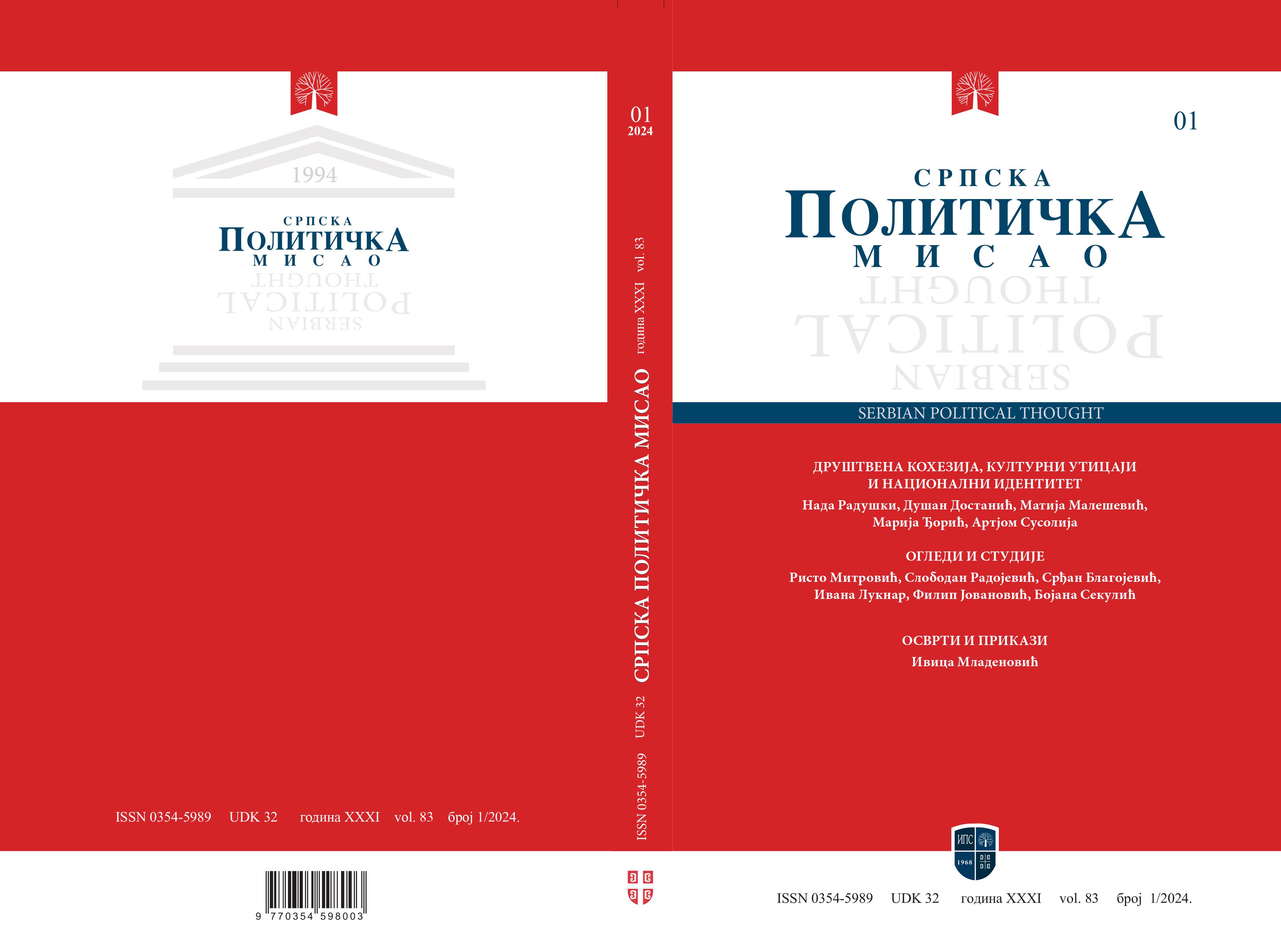INSTITUTIONAL EDUCATION FOR DIALOGUE AND TOLERANCE IN SERBIA
-
Abstract
Education for dialogue and tolerance in institutional schools in the Republic of Serbia began intensively at the time of the beginning of the education reforms in 2001, first by introducing the subjects Religious Education and Civic Education into the educational process, and then by redefining the teaching content in general education subjects in basic and secondary schools. There are many different public debates about the effects of the Religious Education and Civic Education subjects, as well as some partial researches, which indicate different results. The subject of this paper is the consideration of the basic characteristics of education for dialogue and tolerance, as well as educational models of their implementation, with special attention being paid to primary and secondary education in Serbia. In this research, the method of content analysis was applied, which was approached from a holistic point of view, which entailed a detailed study of certain contents in the scientific literature, analysis of relevant documents and published results of previous research. At the same time, special attention was always focused on understanding the meaning of those contents and their structure in the context of the topic of this paper. The results of this research show that institutional education for dialogue and tolerance in Serbia is consistent with: cultural and social values; ideological and political goals of the development of society; and that such education is correlated with relevant international documents and experiences of European democratic societies, all of which should contribute to the development of the neoliberal model of political culture. The potential of education for dialogue and tolerance in Serbia is great, but the reliable effects of such education are still questionable.
References
Bazić, Jovan i Edina Sejfović. 2010. „Građansko vaspitanje i veronauka u osnovnim školama Raškog okruga“, Pedagogija, LXIV (2), 347-357.
Bazić, Jovan i Bojana Sekulić. 2017. „Ideološki ciljevi i sadržaji u programima za prvi ciklus osnovnog obrazovanja u Srbiji“, Politička revija, 52(2), 65-85.
Bazić, Jovan, Vesna Trifunović and Bojana Sekulić. (2023). “Politics in the Classroom”. Knwledge - International Journal, 60(1), 125–130. Retrieved from https://ikm.mk/ojs/index.php/kij/article/view/6335
Council of Europe - CoE 2016: Competences for democratic culture - Living together as equals in culturally diverse democratic societies. Strasbourg: Council of Europe.
Čupić, Čedomir i Milica Joković. 2013. „Značaj obrazovanja za formiranje obrazaca kulture dijaloga, tolerancije i pozitivnih emocija – prilog razvoju nove kulturne politike“. U: Vukotić Veselin i drugi (ur.), Obrazovanje i razvoj. Beograd: Institut društvenih nauka. 222-232.
Eurydice 2017: Građansko vaspitanje u evropskim školama. Luksemburg: European Commission/EACEA/Eurydice, Кancelarija za publikacije Evropske unije.
Đukarić, Branislav. 2021. „Verska nastava u državama Evropske unije“. Tamo daleko. https://tamodaleko.co.rs/verska-nastava-u-drzavama-evropske-unije/
Kuburić, Zorica. 2010. „Verska nastava između prošlosti i budućnosti“. U: Sitarski, Milan, Marko Vujačić i Ivana Bartulović Karastojković (ur.). Isčekujući Evropsku Uniju: Stabilizacija međuetničkih i međureligijskih odnosa na Zapadnom Balkanu. Beograd: Beogradska otvorena škola. 119-136
Ministarstvo prosvete Republike Srbije - МPRS 2023: Udžbenici na jezicima nacionalnih manjina. Ministarstvo prosvete Republike Srbije. https://prosveta.gov.rs/prosveta/udzbenici/udzbenici-na-jezicima-nacionalnih-manjina/, 17.11.2023.
Mršević, Zorica. 2009. „Religijsko obrazovanje i Proces ,Toledo“. Religija i tolerancija, VII (12), 261-274.
NP 2004-2018: Pravilnik o nastavnom planu i programu za prvi i drugi razred osnovnog obrazovanja i vaspitanja, „Prosvetni glasnik“, br. 10/04 - 12/2018.
Pavlović, Zoran, Tamara Džamonja Ignjatović, Aleksandar Baucal i Kaja Damjanović. 2020. Građansko vaspitanje i verska nastava – podjednako (ne)važni?. Beograd: Građanske inicijative.
Philips, Louise. 2011. The Promise of Dialogue: The Dialogic Turn in the Production and knowledge. Amsterdam: John Benjamins publishing CO.
PNUG 2020-2021: Pravilnik o planu nastave i učenja za gimnaziju, „Službeni glasnik“ RS, br. 4/2020, 7/2021.
Schulz, Wolfram, (ed). et al. 2010. „International Association for the Evaluation of Educational Achievement (IEA)“. ICCS 2009 International Report: Civic Knowledge, attitudes, and engagement among lower-secondary students in 38 countries. Amsterdam: IEA.
Šušnjić, Đuro. 2008. „Dijalog i tolerancija - susret razlika“. Kultura, 120, 19-34.
Šuvaković V. Uroš, Jelena Petrović R. and Ivko Nikolić, A. 2023a. „Confessional Instruction or Religious Education: Attitudes of Female Students at the Teacher Education Faculties in Serbia”. Religions 14: 160. https://doi.org/10.3390/rel14020160
Šuvaković, Uroš, V. Ivko Nikolić A. i Jelena Petrović, R. 2023b. „Verska nastava u Srbiji dve decenije posle uvođenja u školski sistem: mišljenja studenata i njihovi stavovi po srodnim pitanjima”. Nacionalni interes. 46(3), 93-117. DOI: https://doi.org/10.5937/nint46-47830
UNESCO 1995: Declaration of Principles on Tolerance. Paris: UNESCO, Culture of Peace Programme.
Ustav 2006: Ustav Republike Srbije, „Službeni glasnik“ RS, br. 98/2006.
Valković, Jerko. 2018. „Tolerancija – od podnošenja do krjeposti“. Diacovensia, 26(2), 313-330. https://doi.org/10.31823/d.26.2.7
Vasić, Slobodan. 2012. „Razmatranje religijske tolerancije u savremenoj srpskoj filozofskoj i društvenoj misli“. Kultura, 134, 325-340.
Zarrín, T. Caldwell [ed.]. 2001. Religious Education in Scools: Ideas and Experiences From around the World. Oxford: International Association for Religious Freedom.
ZOSOV 2017: Zakon o osnovama sistema obrazovanja i vaspitanja, „Službeni glasnik“ RS, br. 88/2017.
ZSOV 2013-2021: Zakon o srednjem obrazovanju i vaspitanju, „Službeni glasnik“ RS, br. 55/2013 - 129/2021.

